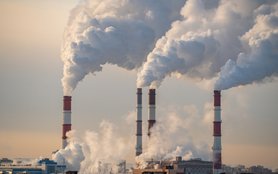Black carbon (a.k.a. soot) emissions are accelerating climate change, hurting the environment, and making people sick. What can be done about it?
Black carbon, also commonly known as soot, is a form of particulate air pollution that has serious implications for the environment, climate, and human health. Black carbon is a Short-Lived Climate Pollutant (SLCP) emitted from the incomplete combustion of fossil fuels and biomass.
Black carbon contributes significantly to climate change with a warming impact up to 1,500 times stronger than CO2 per unit of mass. Black carbon has a short-term warming effect when suspended in the atmosphere. In the long-term, black carbon deposited in the Arctic and in glaciated regions accelerates melting. It can impact regional cloud formation and precipitation patterns and contributes to staple crop losses.
Black carbon also has serious implications for human health, making people sick and shortening lives. It is a component of fine particulate matter (PM2.5) air pollution, which is small enough to be inhaled into the lungs and can enter the bloodstream, which can both cause and exacerbate heart and lung conditions. Air pollution is the leading environmental cause of poor health and premature death globally, killing around 7 million people annually, including 650,000 children. The health impacts of black carbon are not felt equally across the planet, with communities in low- and middle-income countries being disproportionately impacted. Women and girls in particular suffer from household air pollution caused by polluting biomass fuels used to cook food and heat homes.
At a global level, black carbon air pollution contributes to 1.5 billion days of lost work annually and amounts to $8.1 trillion in annual healthcare costs.
Increasing access to clean cooking
Household energy is responsible for around half of black carbon emissions globally. Around 2.5 billion people across the world cook, heat, and light their homes using open fires or inefficient stoves like kerosene, biomass (e.g. wood, animal dung, and crop waste), and coal. The majority of people still lacking access to cleaner burning stoves and fuels live in the poorest regions of the world. In Africa, up to 91% of rural households use polluting biomass fuels, and in the Western Pacific, the proportion is around 82%.
In addition to the health impacts of black carbon, fuel collection and time spent cooking represent a significant time burden that falls disproportionately on women.
Improving access to clean cooking technologies is a powerful way to tackle the climate crisis, health, and gender equality.
Addressing harmful burning practices in agriculture
Agriculture is another major source of black carbon. Agricultural burning is one of the most commonly used methods for removing crop residues after harvest, responsible for around 5% of black carbon emissions globally. In some regions, however, agricultural burning contributes up to 30% of black carbon emissions. The open burning of biomass releases pollutants like black carbon into the air, which impacts air quality and human health.
The agriculture sector not only emits black carbon – it is also negatively affected by its impacts. It is estimated that up to 15% of staple crop yields are lost annually due to the harmful effects of black carbon and co-pollutants such as tropospheric ozone.
Large-scale agriculture needs to shift away from open burning practices, instead incorporating conservation agriculture techniques that protect the quality of the soil, such as no-till farming, and repurposing agricultural residues. For small-holder farmers, this shift can offer benefits too. With financial and technical support, farmers can improve soil quality and repurpose agricultural residue as cost-saving livestock feed instead of burning it.
Stopping methane gas flaring
The process of flaring methane gas (commonly referred to as “natural gas”) emits large amounts of black carbon into the atmosphere, accounting for around 3% of global emissions, alongside other harmful pollutants like methane.
Black carbon emissions in the fossil fuel sector can be reduced by ending non-emergency flaring, which occurs when operators opt to release or burn gas associated with fossil fuel production rather than building the necessary equipment to capture it, as we ultimately work to phase out fossil fuels entirely.
Moving toward a black carbon-free future
It is essential to advocate for policies and programs that reduce black carbon emissions, both for the health of the planet and the health of our communities. Policies that address black carbon across household energy and cooking, agriculture, and fossil fuels can have dramatic, and in some cases nearly immediate, positive impacts on the climate and human health.
Oxfam works to hold the fossil fuel sector accountable for its harmful and polluting actions. We also work extensively on sustainable agriculture, improving corporate practices and supporting small-holder farmers around the world. We partner with communities on the frontlines of poverty and inequality.
We know it’s critical to take action at global and regional levels toward a black carbon-free future, while also maintaining a connection to community level efforts. It is also essential to ensure that large corporations and rich polluters enact policies that reduce black carbon emissions.



